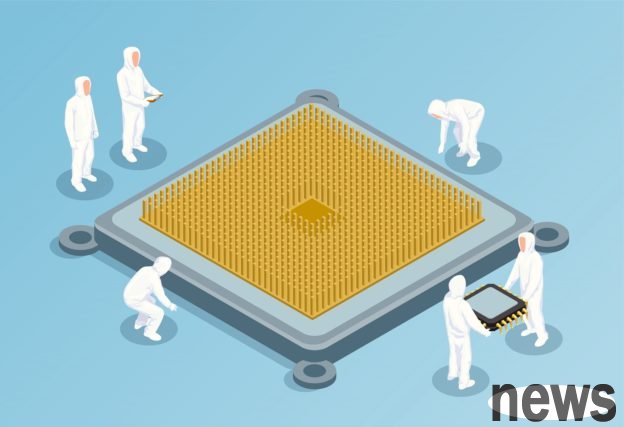US President Trump today said he would be 100% tax-related for all US chips and semiconductor classes. If the manufacturer promises to be in the U.S. factory or in the U.S. factory, "there is no tax-related." Semiconductor industry experts...

US President Trump today said he would be 100% tax-related for all US chips and semiconductor classes. If the manufacturer promises to be in the U.S. factory or in the U.S. factory, "there is no tax-related." Semiconductor industry experts analyzed that Taiwan Power has continued to invest heavily in the United States, with limited impact. Taiwan Power still stands out in the yield performance of advanced production processes and remains the first, but we must pay attention to the taxes in the US and whether it will affect the local production proportion of Taiwan's semiconductor supply chain.
Experts also pointed out that Trump's semiconductor tax policy will accelerate the rooting of global semiconductor industry investment in the United States, allowing the increase in semiconductor supply chain costs and the sales of electronic terminal products, which will bring uncertainty to future demand in the semiconductor market.
Trump said today that he would be 100% tax-related for all US chips and semiconductor courses. If the company promises that it is in the US or in the US, "there is no tax-related"; Trump emphasized that if the current US equipment promises that it is not fulfilled for some reason, the US will re-examine the relevant tax in the future.
In response to this, the Taiwan Telecom responded to the reporter asked that he would not comment on the relevant information.
Liu Peizhen, president of the Taiwan Institute of Industry Database, accepted reporters' interview analysis, highlighting Trump's goal of returning the US semiconductor industry to Rong Yao. Trump previously used the "Red Mandarin" policy, that is, to promote the "One Big Beautiful Bill Act" to increase the investment tax reduction rate of semiconductor industry to 35%. Now Trump has implemented a "stick" policy, that is, to invest in US factories. Otherwise, the US chip and semiconductor classes will be subject to 100% tax liability, which will affect the layout strategies and directions of global semiconductor industry players in the future.
Liu Peizhen said that the United States is the world's largest artificial intelligence (AI) and high-efficiency computing (HPC) application market. Trump wants to collect 100% chip tax responsibilities, which will also activate the layout of semiconductor advanced process operators. The impact of chip tax responsibilities is more comprehensive, and we can continue to observe the progress of major factories in the United States.
Observing Taiwan's semiconductor industry and industry, Liu Peizhen pointed out that Taiwan Power continues to invest actively in the United States, and the impact of 100% of chip tax on Taiwan is limited. The focus is on the US semiconductor supply chain. The import of semiconductor equipment, materials and consumables will increase the cost of construction factories.
Liu Peizhen said that it seems that the competition structure of the overall crystal foundry industry has not been damaged, including Telco, Intel, Samsung, etc., because they invest in factories in the United States, they can all exempt 100% chip tax. "The starting point has not changed." In the future, the competition situation will return to the advanced process yield performance, and in comparison, the TAI power will still be outstanding.
However, for other semiconductor industry practitioners, Liu Peizhen analyzed whether there will be more Taiwan-related supply chains and operators who go to the United States to invest in factories in the future. Due to the 100% chip-related tax variable, the proportion of semiconductors produced in Taiwan has declined, affecting the relevant income or economic investment performance of related personnel, which is worth paying attention.
Overall observation, Liu Peizhen pointed out that the 100% chip tax-related direction proposed by Trump contains the "combination punch" of "privilegedness" and "encouraging" that encourages companies to invest in the United States to be exempted. If they do not invest, they will suffer from impunity taxes. This will also allow semiconductor industry globally to feel a certain degree of pressure, accelerate the root of global semiconductor industry investment in the United States. It is not ruled out that semiconductor industry from all over the country will go to the United States to invest in factories.
Liu Peizhen said that this will inevitably increase the supply chain costs of the upstream, midstream and downstream semiconductors, as well as the sales price of end-application products, and further affect the consumption intention or cyclical changes in the electronic terminal product market, bringing a certain degree of uncertainty to the future demand of the semiconductor market.
She pointed out that Trump's 100% chip tax responsibilities will have a profound impact on the global semiconductor electronic industry layout distribution, corporate investment planning and geopolitical considerations in the future, and corporate operations will have more challenges.
Extended reading: Trump 100% chip tax responsibilities who has the greatest impact? South Korea: Samsung, SK Hynix is not suitable Trump once again named Taiwan and Taiwan Power's investment of US$20,000 Apple tyrene, bulb, Samsung deploys Metallurgical chip supply chain